Hitachi Deskstar 7K1000: Two Terabyte RAID Redux
by Gary Key on April 23, 2007 12:00 PM EST- Posted in
- Storage
PCMark05 Performance
We are utilizing the HDD test suite within PCMark05 for further comparative hard disk scores as it provides a mixture of actual application results and specific read/write percentages utilized within these programs. The program utilizes the RankDisk application within the Intel IPEAK SPT suite of tools to record a trace of disk activity during usage of real world applications. The HDD test suite contains 53% read and 47% write operations with each trace section utilizing varied amounts of read or write operations. Further details on the PCMark05 HDD tests can be found in our previous articles in this series.
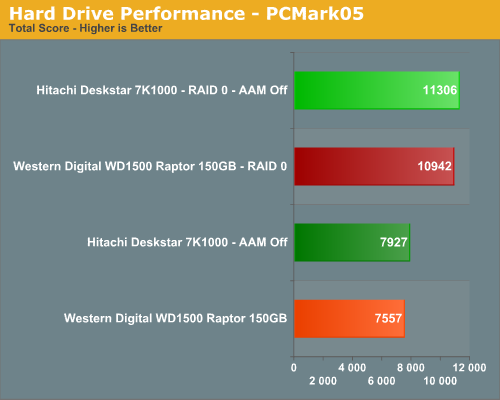
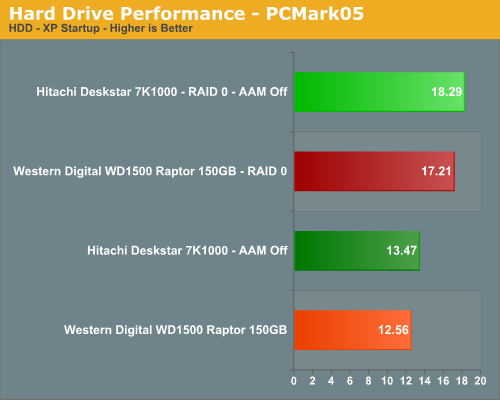
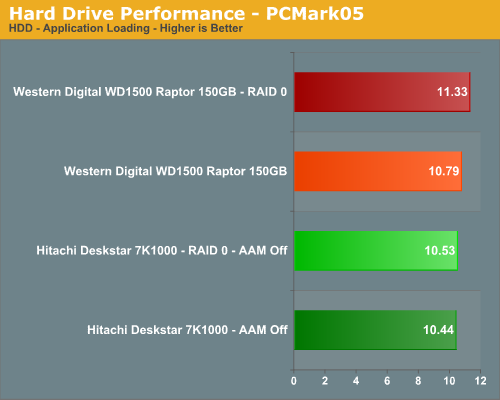
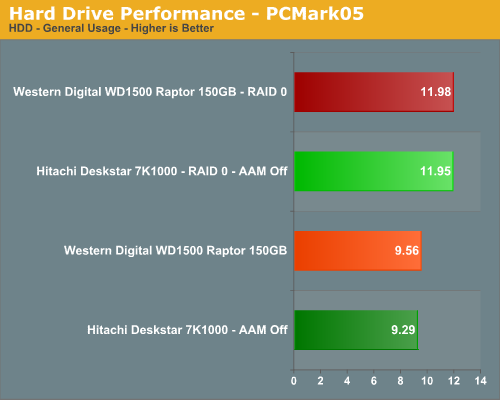
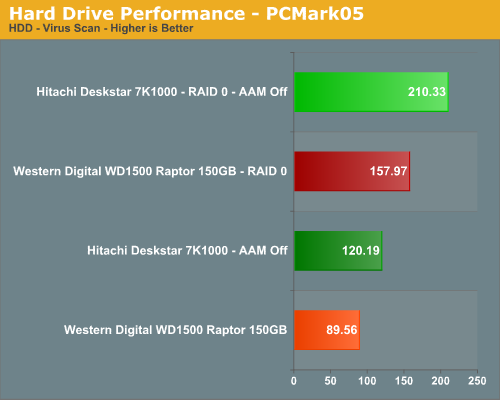
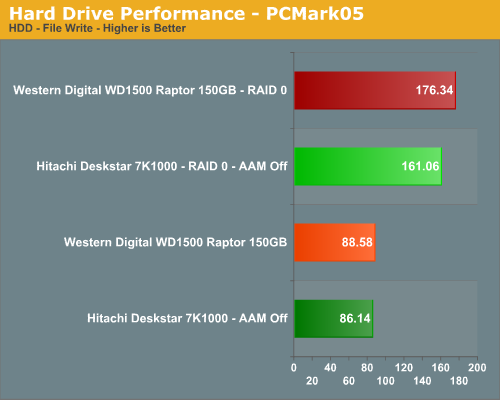
Our PCMark05 RAID 0 results show a 43% improvement over the single Hitachi drive results. Our previous test bed showed a 25% improvement with the RAID 0 setup. The 7K1000 combination scores better 3% in RAID 0 and 4% better in single drive testing than the WD 150GB Raptor setup. In previous testing the differences were withing a half percent between the two drives. We ran the test several times and also changed motherboards but had the same results with an Intel chipset.
The major performance delta between the 7K1000 single and RAID 0 configuration is in the Windows Startup, Anti-Virus, and File Write tests. We fully expected the File Write tests to show major improvements as this is an area where RAID 0 performance usually shines. We see minor differences occurring in the Application Loading test where read speeds are critical in a variety of applications. However, our General Usage test is showing a 28% improvement in a test that balances both read and write speeds. This indicates the strength of a RAID 0 setup in applications such as media encoding that can benefit from the improved speeds.
The Raptor's superior rotational/access speeds allow it to basically score slightly better than the 7K1000 except in the Virus Scan and Windows startup tests. Overall, if you need to greatly improve your PCMark05 benchmark scores then RAID 0 will certainly do that for you. In the Application results which utilize actual applications there is minimal impact but the General Usage result indicates a 25% improvement. The question still remains if these improvement percentages will correlate to improvements in actual applications.
We are utilizing the HDD test suite within PCMark05 for further comparative hard disk scores as it provides a mixture of actual application results and specific read/write percentages utilized within these programs. The program utilizes the RankDisk application within the Intel IPEAK SPT suite of tools to record a trace of disk activity during usage of real world applications. The HDD test suite contains 53% read and 47% write operations with each trace section utilizing varied amounts of read or write operations. Further details on the PCMark05 HDD tests can be found in our previous articles in this series.






Our PCMark05 RAID 0 results show a 43% improvement over the single Hitachi drive results. Our previous test bed showed a 25% improvement with the RAID 0 setup. The 7K1000 combination scores better 3% in RAID 0 and 4% better in single drive testing than the WD 150GB Raptor setup. In previous testing the differences were withing a half percent between the two drives. We ran the test several times and also changed motherboards but had the same results with an Intel chipset.
The major performance delta between the 7K1000 single and RAID 0 configuration is in the Windows Startup, Anti-Virus, and File Write tests. We fully expected the File Write tests to show major improvements as this is an area where RAID 0 performance usually shines. We see minor differences occurring in the Application Loading test where read speeds are critical in a variety of applications. However, our General Usage test is showing a 28% improvement in a test that balances both read and write speeds. This indicates the strength of a RAID 0 setup in applications such as media encoding that can benefit from the improved speeds.
The Raptor's superior rotational/access speeds allow it to basically score slightly better than the 7K1000 except in the Virus Scan and Windows startup tests. Overall, if you need to greatly improve your PCMark05 benchmark scores then RAID 0 will certainly do that for you. In the Application results which utilize actual applications there is minimal impact but the General Usage result indicates a 25% improvement. The question still remains if these improvement percentages will correlate to improvements in actual applications.










26 Comments
View All Comments
sprockkets - Monday, April 23, 2007 - link
Pic wanted of smoked drive.lplatypus - Monday, April 23, 2007 - link
RAID-0 is not a general solution to improve disk performance. It solves a specific problem: it increases sequential disk bandwidth. If you're not doing sequential disk accesses, then don't expect RAID-0 to help.Of course if your application is doing random disk accesses unnecessarily, then that's a programming problem. But often an application really does need to do random disk accesses.
Advanced filesystems attempt to make common file access patterns translate into sequential disk accesses, so poor RAID-0 performance might be a symptom of a poor filesystem design in your OS. Yet there is a limit to how much the filesystem can produce sequential disk accesses.
yyrkoon - Monday, April 23, 2007 - link
GPU limited HDDs eh ? Come on guys, this statement is starting to sound as though you think using RAID0 in a gaming system is going to increase FPS or something . . . which, we all know is wrong(or should know).
Gee, a Raptor smoking its platters, this aught to quiet those people who think the Raptors are impervious to melt downs. Seriously though, how much was this HDD used ? How old was it ? Personally, I think the answers to both the two questions above, would be worth well more than about 20 AT articles . . . and I must say I rather enjoy reading the articles.
Looking forward to you adding Seagates fastest of their SATA line, and would like to know if you have plans, or would consider testing the NL35 line as well. From what little I have read, the NL35 line are supposed to be geared towards Video, so I would assume the sustained throughput would be higher, but thats why the request for a test of these drives.
nullpointerus - Monday, April 23, 2007 - link
As the article itself says, they did so to answer readers' (IMO ridiculous) objections to the previous RAID article. So you should poke fun at the gamer RAID crowd instead.
yyrkoon - Tuesday, April 24, 2007 - link
That was not my point, I am fairly confident that AT staff doesnt believe this, but it only leads to confusion, for the less tech savvy. I can hear it all over the wanna be 'geek' 'channels' already . . . 'OMG RAID0 increases FPS in <insert first person title name here>, becasue AT said so . . .'. Even though we all know, this is not what was said.SilthDraeth - Monday, April 23, 2007 - link
hopefully our second round of results will answer more questions than it raises answers.johnsonx - Tuesday, April 24, 2007 - link
The last word in that sentence just needs to go away. Then it makes perfect sense: "... answer more questions than it raises."
joex444 - Monday, April 23, 2007 - link
I don't find it confusing, but then again I passed grade 4.vailr - Monday, April 23, 2007 - link
Could you comment on AHCI mode? Comparing enabled in bios vs. disabled?The AHCI "hot swap" feature, for example. Seems to work fine when connected to a SATA JMicron controller, yet DO NOT when connected to an Intel port. On the Gigabyte DS3 board, for one example.
Also: there are newer Intel Inf and Matrix drivers.
Used for this report:
System Platform Drivers:
Intel 8.1.1.1010
Intel Matrix RAID 6.2.1.1002
vs.
Intel Inf Driver Version 8.4.0.1010 Beta
http://www.station-drivers.com/page/intel%20chipse...">http://www.station-drivers.com/page/intel%20chipse...
Matrix Storage Manager drivers version 7.0.0.1020 WHQL
http://www.station-drivers.com/page/intel%20raid.h...">http://www.station-drivers.com/page/intel%20raid.h...
DigitalFreak - Monday, April 23, 2007 - link
AT yet again proves the RAID-0 freak'tards wrong.